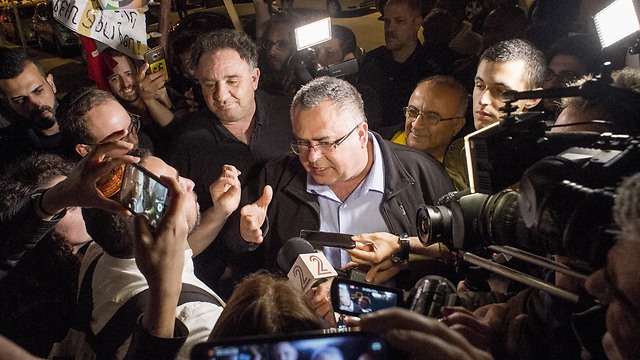
IPBC employees protest Netanyahu-Kahlon agreement
צילום: אבי מועלם
The future of Israeli democracy is in our hands
Op-ed: Our government takes every opportunity to remind the world that we are the only democracy in the Middle East, but the moves initiated by its members are eating into the democratic rules of the game, violating minority rights and preventing anti-government criticism. There are people who can curb this trend, but why isn’t their voice being heard?
Last week, democracy collapsed in Venezuela. The country’s Supreme Court, which is dominated by judges appointed by the government, disapproved of the power of the opposition-led congress. At President Nicolas Maduro’s request, the court stripped the national legislature of its powers. On Saturday, however, the court revised its ruling following the outrage it caused.

Israel is neither Venezuela of 2017 nor Germany of 1933. It was and still is a lively democracy based on a strong legal system, free press, deeply rooted rules of the political game and, above all, a certain national character. The air that the Israelis are accustomed to breathing, the air they want to breath, is democratic air.
Our government is very proud of that. It takes every opportunity to remind the world that we are the only democracy in the Middle East. It likes to be the only one, it likes to be called democratic, but it is reluctant to pay the price. In the past few months, it has moved from preaching to action: The moves initiated by its members are diverse, but there is one trend—eating into the democratic rules of the game, violating minority rights and preventing anti-government criticism.

IPBC employees protest outside Coalition Chairman David Bitan’s house, Saturday evening. This is not the time to keep silent (Photo: Yuval Chen) (צילום: יובל חן)
Will we wake up one morning and be notified that we are living in Recep Tayyip Erdogan’s Turkey? It’s hard to tell. Sometimes the threat seems real, and sometimes it seems pathetic. The story of the rise and fall of the Israel Public Broadcasting Corporation (IPBC) demonstrates the dilemma. On the one hand, we are talking about a prime minister who has decided to appropriate state media organizations and put his associates in control of them. On the other hand, we are talking about a capricious, media-crazy prime minister, who is occupied with minor issues. What he did to public broadcasting is a comedy of errors.
Contrary to the impression that has been created, the future of Israeli democracy is not only in the hands of Prime Minister Benjamin Netanyahu, Finance Minister Moshe Kahlon, Likud Ministers Yariv Levin, Tzachi Hanegbi and Miri Regev and Coalition Chairman David Bitan. Everything is predetermined, but there is freedom of choice: There are people who can curb this trend. The question is why is their voice not being heard.
Let’s start with the ruling party. There are 30 members in the Likud’s Knesset faction. Many of them are concerned by Netanyahu’s conduct. Some of them voice harsh criticism against the prime minister in private conversations. They don’t have the courage to say it public. There is no doubt about it: Netanyahu, with considerable talent, emasculated them.
The most radical example is Tzachi Hanegbi, who used to be an independent politician. One could have disagreed with him, one could have even been afraid of him, but no one could have neutralized him. Under Netanyahu, he has become a junior spokesperson for the prime minister. In theory, he is the communications minister. In practice, an agreement is finalized in his absence, a ridiculous compromise between two caprices, Netanyahu’s and Kahlon’s, yet he volunteers to act as the prime minister’s spokesperson. I watched the interview he gave Channel 2 New on Friday evening. He was pathetic.
Let’s move on to the government workers. The attorney general sees the law being ridiculed, and is pleased with what has been achieved. His deputies act the same way: They spend their days legitimizing these distortions instead of calling a spade a spade. A decade or two ago, such a process would have been stopped by the gatekeepers. Today, they are mainly their own keepers.
And most importantly, the broad public. Only few people are interested in the issues I mentioned here. The problem is that when they start interesting many people, it will be too late. This is not the time to keep silent.
(Translated and edited by Sandy Livak-Furmanski)










